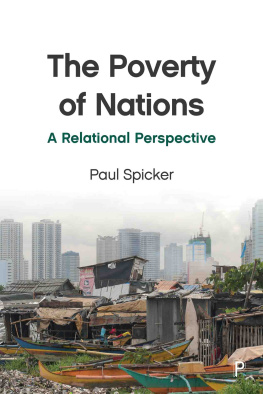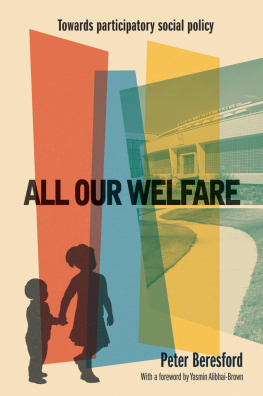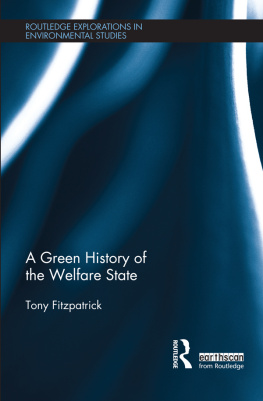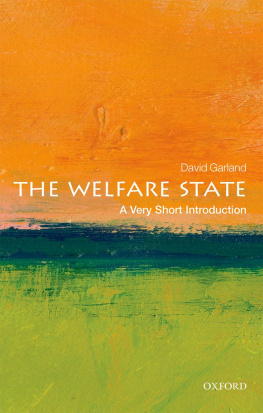Arguments for Welfare
Rowman & Littlefield International Policy Impacts
The Rowman & Littlefield InternationalPolicy Impacts series aims to bridge the gap between the academic community and policymakers: providing academics with a format and channel for policy-relevant research and ensuring that policymakers are informed about the best research available to them. Rowman & Littlefield InternationalPolicy Impacts provides a forum for knowledge exchange, a bank of information and a toolkit for implementation.
Titles in the Series:
EU Cohesion Policy in Practice: What Does It Achieve ? John Bachtler, Iain Begg, David Charles and Laura Polverari
Arguments for Welfare: The Welfare State and Social Policy , Paul Spicker
A Better Policy Transfer: What To and Not To Do When Looking to Foreign Systems , David P. Dolowitz (forthcoming)
Arguments for Welfare
The Welfare State and Social Policy
Paul Spicker
London New York
Published by Rowman & Littlefield International Ltd
Unit A, Whitacre Mews, 26-34 Stannary Street, London SE11 4AB
www.rowmaninternational.com
Rowman & Littlefield International Ltd. is an affiliate of Rowman & Littlefield
4501 Forbes Boulevard, Suite 200, Lanham, Maryland 20706, USA
With additional offices in Boulder, New York, Toronto (Canada), and Plymouth (UK)
www.rowman.com
Copyright 2017 Paul Spicker
All rights reserved . No part of this book may be reproduced in any form or by any electronic or mechanical means, including information storage and retrieval systems, without written permission from the publisher, except by a reviewer who may quote passages in a review.
British Library Cataloguing in Publication Data
A catalogue record for this book is available from the British Library
ISBN: HB 978-1-78660-301-2
PB 978-1-78660-302-9
Library of Congress Cataloging-in-Publication Data
ISBN 978-1-78660-301-2 (cloth: alk. paper)
ISBN 978-1-78660-302-9 (pbk: alk. paper)
ISBN 978-1-78660-303-6 (electronic)

The paper used in this publication meets the minimum requirements of American National Standard for Information SciencesPermanence of Paper for Printed Library Materials, ANSI/NISO Z39.48-1992.
Printed in the United States of America
Contents
Chapter One
Understanding the Welfare State
Some arguments are so obvious that no-one makes them. There is not much discussion about whether people should live in families, whether children should be educated, whether people should be able to buy food or whether there should be laws. There may be those who take a different view, but they are on the fringes. Their positions will be reviewed in passing, discussed in academic circles and occasionally someone experiments with alternatives, but the alternatives are not taken very seriously. The world we live in is taken for granted.
The provision of social welfare is different. On one hand, nearly every developed society is engaged to some degree with the issues of social protection. There are commonly occurring patterns of social need, and there is a constellation of benefits and services, typically covering old age, ill health and the interruption of earnings. Many independent groups and organisations have made arrangements for the provision of welfare, and in general there are complex, overlapping networks through which services are delivered. Beyond that, in every democratic society, government has also come to play a role in provision, sometimes providing services directly, but almost invariably recognising that it has some responsibility for the direction of welfare policy.
On the other hand, and despite the very generality of these arrangements, there is a chorus of dissent. The main focus of criticism has been about the idea that government should be involved at all. Many of the basic precepts of economic theory seem to argue against collective provision and distribution of goods. Arguments made against state welfare for hundreds of years that people who receive welfare are a burden on others, that welfare encourages idleness, that it is wasteful are frequently repeated, usually with the claim that even if welfare worked in the past, this time its different. Often welfare systems are deeply resented. If we need to be reminded why we ought to have welfare, it is because so many people have come to think that we should not.
THE WELFARE STATE
There are some widespread misconceptions about welfare, but it will be difficult even to discuss the issue without at least a shared vocabulary. The first problem lies with the term welfare itself. Economists use the term to refer generally to peoples well-being, but that is not the main subject here. Part of the general argument for a welfare state is an argument for making things better. However, lots of things make peoples lives better music, comedy, open countryside, books, gardening, shopping, dancing or messing around in boats and welfare states do not have much to do with any of them. There are publicly funded activities in many countries which help people do some of these things public broadcasters, parks, sports grounds, libraries and community theatres and they are almost certainly better places to live because of it, because then people have choices for a good life that they would not otherwise have. This is not, however, the stuff that welfare states are made of. The main use of the word welfare refers instead to the provision of a conventional range of services systems that have been developed to safeguard vulnerable people in a range of contingencies. The activities of welfare states are typically concerned with health, social security, housing, education, employment support and social care. The people who are being supported, typically pensioners, children, people with disabilities and those who are unemployed, are people who have been identified as having needs that ought to be met through collective social arrangements.
Even within that discourse, people understand the terms differently. The dominant use of the term welfare in the United States is focused on a relatively narrow group of services, mainly concerned with people of working age on very low incomes. That sense was hardly used in Europe fifteen or twenty years ago, but it has become more and more prevalent, especially in Britain. The most obvious difference in definitions is that the broader sense of the term includes provision for medical care, pensions, education, housing support and social care. It is not difficult to defend welfare in the narrow sense as well as in a broader sense, but quite apart from the arbitrariness of the definition, the restriction of the argument has had some pernicious effects. One is the deliberate separation of arguments for welfare where the legitimacy of public provision is generally accepted from others where it is not: publicly funded schooling is usually approved of, support for low-income families with children often is not. A second example is the distinction drawn between arguments for pensions and arguments for support for younger people who are unable to work, often presented as a difference between the deserving and undeserving. There are few arguments for offering people a pension at sixty-five that cannot be made for supporting unemployed people aged fifty-eight. These distinctions create problems for practice too. Services which are confined to residual, stigmatised groups tend equally to be stigma-tised, complex and expensive, and treated as a public burden, and arguments against welfare in these terms tend to be self-fulfilling.











 The paper used in this publication meets the minimum requirements of American National Standard for Information SciencesPermanence of Paper for Printed Library Materials, ANSI/NISO Z39.48-1992.
The paper used in this publication meets the minimum requirements of American National Standard for Information SciencesPermanence of Paper for Printed Library Materials, ANSI/NISO Z39.48-1992.